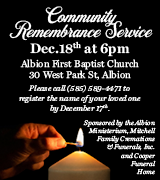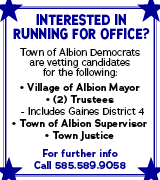Drennan says his experience in law enforcement would be an asset as sheriff

Tom Drennan
ALBION – Tom Drennan sees his experience working his way up through the ranks of the Sheriff’s Department, as well as his vast training in a 23-year career, as a great asset for the next sheriff in Orleans County.
Drennan is currently the chief deputy for the Sheriff’s Department. He started as a road patrol deputy in September 1992 and has been promoted to lieutenant, criminal investigator, major and chief deputy.
Drennan, 50, has been endorsed by the Republican Party Committee to be sheriff, replacing Scott Hess, who is retiring on Dec. 31. Drennan faces election challenges from Randy Bower, a current county dispatcher who has the Conservative Party endorsement, and former Medina police investigator Don Organisciak. Bower said he intends to force a Republican primary on Sept. 10.
Drennan lives in Kendall and has been a member of the Kendall Fire Department for 33 years. He has been a fire commissioner the past 9 years, and is currently vice chairman.
His wife, Terri Drennan, is the crime victims’ services coordinator in Orleans County. The Drennans have three children ages 13, 22 and 24.
Before starting a law enforcement career, Drennan worked for a fruit farm in Kendall and a machining company in Rochester.
The following interview was conducted with Drennan last week:
Question: I didn’t know you worked at a farm and as a machinist.
Answer: I got to where I was machining and rebuilding motors, everything from lawn mower motors to big diesel bulldozer engines, machining them and then putting them back together again. I did that for a few years and went back to the original machine shop where I worked, Davenport Screw Machines. I went to the police academy on my own over at Genesee Community, not knowing what the economy was going to do.
Q: That was early ’90s?
A: Right. I started the academy in September 1990, a couple days after my father passed away, and graduated in March 1991. I continued working in the machining industry until I was contacted by then Sheriff Dave Green in regards to if I was interested in law enforcement and if I wanted to come on board. I said I was. I ran into him at the County Fair in July 1992 and on Sept. 1, I was hired.
That is when Civil Service started. I had taken the test, scored well and was actually the first Civil Service deputy hired by the Sheriff’s Department.
I had been an auxiliary police member and rode every other weekend with a deputy. I started that in ’89.
Q: Where do you think you got the interest in law enforcement?
A: I had been around law enforcement officers throughout my whole life. It really started in the fire service. I grew up in the fire service. My father (Jack Drennan) was a member of the Kendall Fire Department. He was a past chief in the ’70s. Since I could walk I have been at the fire hall. My father got me interested in public service. He was very big into the ambulance and EMT side of the fire service.
I grew up there at the fire hall. I was around law enforcement people coming in and out of the fire hall.

Photos by Tom Rivers – Tom Drennan leads a mass casualty training exercise on May 31, 2014 at Medina schools. The drill involved police officers and firefighters from several agencies. Drennan said recent school shootings in the country prompted local law enforcement to press for training to improve their response to try to minimize any chaos and casualties from an active shooter.
Q: Could you describe the chief deputy duties?
A: It has a lot of administrative parts to it. You’re still connected with the criminal investigation side of things or the road patrol and the day-to-day. I’ve been very fortunate I’m involved in almost every facet of the department on a day-to-day basis, hour after hour. I’m in the front office with the civil division, multiple times a day. There are questions coming in from the lobby, reports, and how things were handled, and questions being referred to me from the upfront office. They may have someone on the line who has questions.
I meet with the jail superintendent on a daily basis about what’s going on in the jail. Over the last three years I’ve really learned a lot about the operations of the jail and the construction work that has been going on over there.
I started on afternoons as a deputy, then I was named OIC (officer in charge). When the supervisor wasn’t there, I was in charge. From there I took the Civil Service Exam and became a lieutenant and got to run a shift, which is like running a small department. Sometimes it was me and one other guy. Others times it was me and four or five other people if we were doing a detail.
I had an opportunity to go into the criminal investigation side of things. I took that solely because Chris Bourke was the lieutenant on days and I could foresee him being there a long time. If I ever wanted to get off for concerts, sporting events and Little League games, I thought here was an opportunity to learn something and go into another direction with the criminal investigation side, and also be able to be home. I did that for quite a while.
Q: It does seem like you and department leaders are visible on many of the calls.
A: We’re big enough with about 100 employees that you have to be an administrator and delegate at times. But we’re also small enough, especially with the criminal division when you have three people working and they’re all be tied up, that you have to get involved.
If we get a call at the County Office Building, that there is somebody out of control at social services, you get up from desk and be the first person there. There could be a mental health situation and someone is out of control at Mental Health. You go over there and try to help out and get things under control or figure out what’s going on until the patrols can get there.
Q: Can having a presence diffuse situations if people see an officer?
A: Absolutely. Over the years we deal with the same people over and over again, or the next generation, so when we do show up sometimes you’ll deal with someone who remembers who you were and that you helped them. That can help diffuse the situation.
Q: Why do you want to be sheriff?
A: My qualifications, training and what I’ve done with my career, I just want to continue building on that and give back to the community. Public safety is priority one. I’ve been invested in it my whole life. I want to help bring that next generation up. We’re going through a transition in our department with a lot of young guys coming in. I’d like to be a part of that molding and shaping of that next generation.
Q: The county is looking at a study for policing services in the county. That study could point to a county-wide policing service, perhaps with substations at the eastern and western ends.
A: You would have to have substations. It wouldn’t make good sense to have those cars come to Albion for everything they have to do with the processing and the arrests. It would be nice to get in at a spot where you need to use a hard-wired computer.
Genesee County has it where a deputy goes to Le Roy and picks up a car and stays over at that end. Maybe you could do that here. I have to think with the study and anything that could potentially take effect, it could be years before they could hammer out any details. People don’t like giving up their law enforcement, and for good reason.
If the county took over and someone called 911 in Medina, how long would it take for that person to get there? Right now they’re used to a couple minute response time. They’re concerned they might not get that same service.
You’d have to make a lot of changes on how you ran the department to make sure you are providing the best coverage that you can. It would give you an opportunity to move some people around. Now we’re working on shared services. It will be interesting to see what they come up with.

Tom Drennan has been the face of the Sheriff’s Department at many events and press conferences in recent years. He represented the Sheriff’s Department during a public forum on Oct. 21, 2013 about the SAFE Act. Drennan, left, is pictured with Orleans County District Attorney Joe Cardone, second from left, State Assemblyman Steve Hawley, and Steve Aldstadt, state president of the Shooters Committee on Political Education or SCOPE.
Q: It seems like 20-plus years in law enforcement would wear on a person. You could retire.
A: I could, but I hope to finish my career and walk out with my head held high and know that I made a difference. With the sheriff’s position I’d like to go in there, make some improvements, and know that when I left the department is in a better place than when I came in, with some changes, some different philosophies and a different identity for the department.
Q: What are some of the different philosophies you might implement?
A: Where we are today with the Sheriff’s Department is different than how I envision it. I think we need to get back to be more involved in the community. We need more accountability and professionalism, so we’re out there working with the people, interacting at town events, career days at schools. We have increased our involvement and interactions with the schools over the last year and a half and I’d like to see that grow and strengthen.
When you get into the community you, people tell you their complaints. It’s finding out exactly what the peoples’ problems are. It might seem like something small to you, but to them it means something. All they want to know is if someone is listening to them, can somebody make a difference.
We can’t solve all the world’s problems. We can’t make everybody happy. I understand that. I’ve certainly dealt with that over my career. But we can be invested in the community and let people know that we are here for them, doing everything we can to make their community better.
Q: Do you have you have a sense if things have got worse around here, crime-wise, over your career?
A: We certainly have a major problem currently with heroin. It started a few years ago with the pills and spilled over with heroin. It’s something that can get out of control in a hurry. It always takes us a little longer out here (in Orleans County) to be affected, but once it creeps in and gets a foothold, people become dependent upon it.
We have our problems out here, just like the city does, but not at that volume.
Q: So the heroin is an issue in our county as we speak?
A: It’s a serious, serious problem.
Q: For a rural county, it seems like we have a lot of serious crimes.
A: We’re kind of made for that, being between Rochester and Niagara Falls. Batavia has also grown quite a bit, being near the Thruway. We’re also right here on the border. We don’t see a ton of problems coming across the lake. But this is a heavy traffic area for tourism passing through, with people coming to shop and whatnot.
A lot of our problems come out of the City of Rochester as far as the drugs and the kids travelling back and forth. We’re kind of made as the great little country county, yet we’re right in the middle of a lot of problems.
Q: Does that effect the Sheriff’s Department, in terms of having to prepare and respond to serious crimes?
A: You have to prepare for so many things with such a small foundation of workers. That’s another thing I’d like to see changed. So much has fallen on the shoulders of so few. I’d like to see that spread out.

Tom Drennan, pictured at the turtle race on Saturday at the Albion Strawberry Festival, said the Sheriff’s Department needs to be more visible at community events.
Q: With only 23 deputies, investigators or lieutenants, that doesn’t seem like a lot to work with for the Sheriff’s Department.
A: It’s not. We typically have 16 guys we can draw from. If something bad happens, we can get depleted in a hurry. Not only do we have to deal with a situation like the DeFilipps’ shooting, where you have to have the manpower to take care of that situation. But now immediately you have to get more personnel in to take care of the county.
That’s why we have developed a good relationship with the local police departments. They come out and assist us and we go in and assist them. The State Police often times on a major incident we will use their crime ID guys and their technicians to help us because we just can’t afford to lose two or three people or five people to start collecting evidence when we have so much other work to do. We have to have those relationships because we’re just not big enough.
Q: It seems tricky to get the staff you need while juggling the budget issues.
A: Yeah. You wear many hats at different times throughout the day.
I understand (if I became sheriff) my role would change to even more administrative tasks than I have now. But I hope to continue to be utilized as a resource. If someone comes out of the interview room, I can give some advice, I can draw from that experience.
That is what will be so important during this transition is being there for the people so they can rely on you. I think that is a huge part of this race, that I can draw from that experience, refer to a class that I went to or a I case that I had. If I don’t have all the answers, I can pull out my phone and reach into the contacts.
I have a desk drawer full of business cards of associates and people that I’ve met throughout the area that are in law enforcement. I can ask, “How did you guys handle this? I know you had this before.” There are a lot of resources out there that I’ve made contact with.
Q: People wonder who you would have as undersheriff?
A: I have been asked by a lot of people about that. I’ve been telling everyone that this race is about the sheriff’s position, not the undersheriff’s position. The undersheriff works at the discretion of the sheriff. He could be here today and gone tomorrow at the choice of the sheriff or on their own. They might decide to call it a career or to go on to something else.
I want to make this about the sheriff’s race and not the undersheriff’s race. I can assure you, (the undersheriff) will be a strong individual that will come in. I have been approached by a half dozen people. As we go through the process in the next few months, I expect I’ll be approached by more.
There will be a regular interview process. I want to see the background of anybody that is interested. Anybody can apply. We’ll go through it and when the election is over, it will be announced.
Q: If you’re elected sheriff, is the undersheriff your choice or does the Legislature weigh in?
A: With that topic and just about any other topic, I’m willing to talk to anybody. I’m not the sole source of ideas. I don’t have all of the answers. I’ll talk with people and get their ideas.
A deputy could have a good idea. I’ll listen to the supervisors, the deputies, the jailors, everybody. If somebody has an idea, let’s talk about it.
When it comes time to make a decision, it would fall on my shoulders. I am prepared for that.
Q: Does being married to the crime victims’ coordinator help you in your job?
A: Oh, definitely. I have learned a ton from her about victims’ issues. I take that into consideration. In investigations you have to think about them. It has strengthened me in my ability to do the job because of who she is and what she brings to my profession. It has had a tremendous impact on my ability to do my job.
I want to make sure the service that myself or the people in the Sheriff’s Office are doing is the best for victims.
It’s made me a better law enforcement officer.

Tom Drennan is pictured with his wife Terri, the county’s crime victims’ services coordinator.
Q: Anything else you want to say?
A: I guess to make it as simple as possible, in this whole process, it isn’t about me. I could walk away knowing that I had a good career and find something else to do. It could be continuing on in investigations, doing an outdoor job on a farm, whatever it may be.
But it’s about the public and the community. I want to improve where we are today as a community with the protection we give them. I’m not a politician, I’m a cop. I’ll learn to do so of that politician stuff.
That’s where I’m coming from. This is about public safety, priority one, to make our schools and community safer.






























































